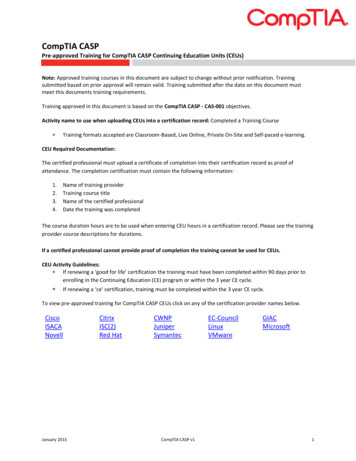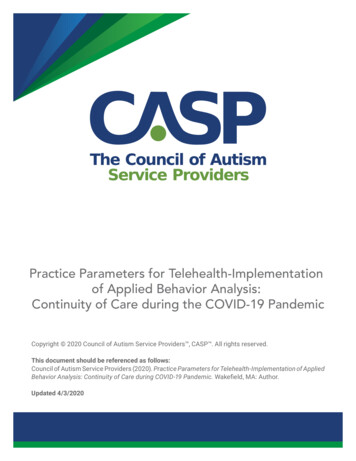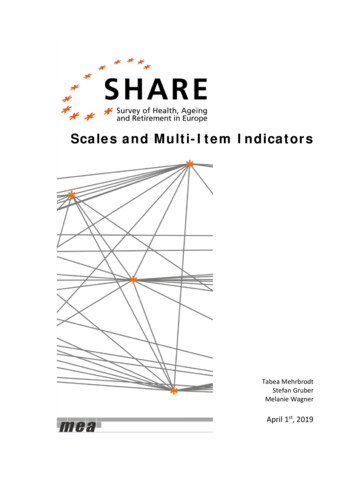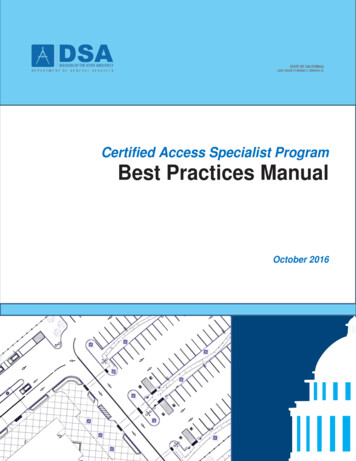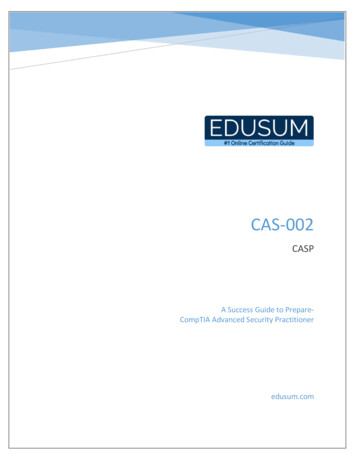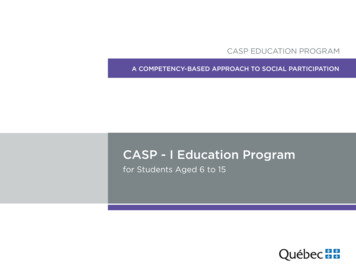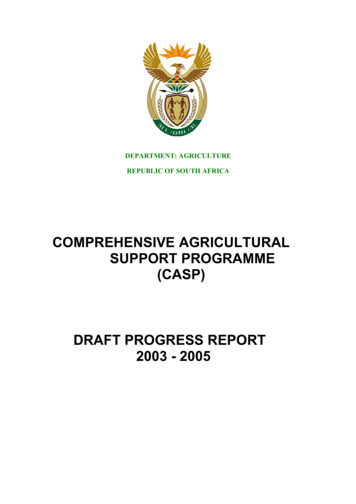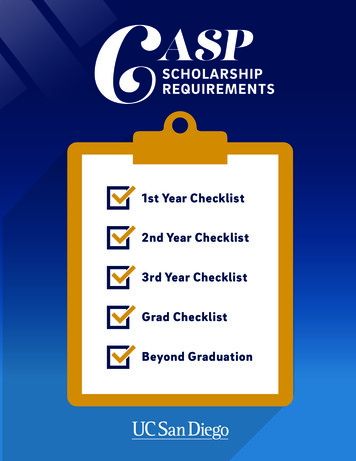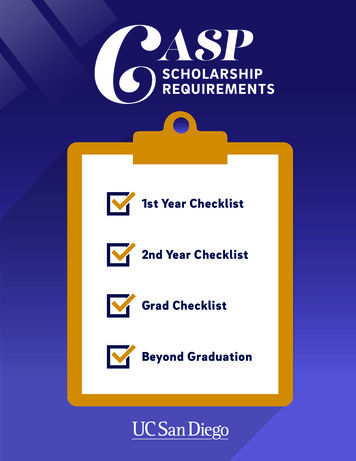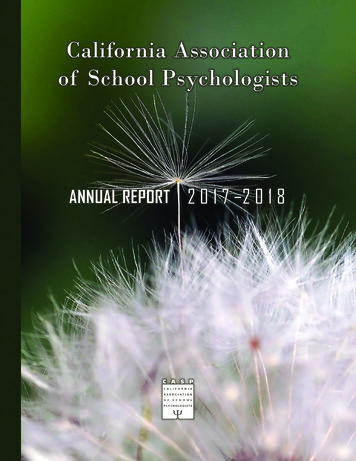
Transcription
TOCCASP ANNUAL REPORT 2017–2018California Associationof School Psychologists2 0 1 7 –2 0 1 8ANNUAL REPORT1
TOCCASP ANNUAL REPORT 2017–2018CASP Vision StatementThe Vision of the California Association of School Psychologists is to foster the social,emotional and academic wellbeing of all students by collaborating with families,school staff, and the community to ensure that students are educated in schools thatsupport equity, access, and respect for all.Adopted by the Board of Directors in November 2014CASP Mission StatementThe CASP mission is to foster the wellbeing of the children, schools and communitieswe serve through legislative advocacy, professional development, communications,publications, ethics guidelines, and direct services to members.Adopted by the Board of Directors in August 2017CASP Executive CommitteePresident: Pedro Olveradr.pedro.olvera@gmail.comPast President: Tom Scotttsopp@lbschools.netPresident-Elect: Brian Leungbrian.leung@lmu.eduSecretary-Treasurer, Seble Gebremedhinseble.bg@gmail.comCASP Executive DirectorHeidi Holmbladexecutivedirector@casponline.orgContact CASP:1020 12th Street, Suite 200, Sacramento, California 95814Phone (916) 444-1595 Fax (916) 444-1597http://www.casponline.org2
CASP ANNUAL REPORTCONTACT 2017–2018Table of ContentsPageCASP Accomplishments in 2017-2018.42017 Awards.8Region Reports. 10Committee and Specialist Reports. 13CASP Board of Directors 2017-2018. 16CASP Staff. 16Note to Readers: This is the Annual Report of CASP’s activities for theacademic and fiscal year that ended June 30, 2018. The CASP Boardhas achieved significant milestones as a result of its efforts, andthese accomplishments will benefit the students of California and theprofession of School Psychology. Thanks to all board members andstaff who contributed to this effort.3
TOCCASP ANNUAL REPORT 2017–2018CASP Accomplishments in 2017-2018MembershipThe number of members continues to slowly increase, but still hovering at 1,800.Developed some plans to change that, including more frequent reminders to renew lapsedmembership, a plan to contact lapsed NASP members to remind them of CASP, and a newplan being developed for LEP membership. The average monthly membership was 1,722.Here are the 2017-2018 average totals for the membership categories:FinancialsCASP’s 2017-2018 budget was set at 651,800. However, better-than-expected revenuefrom the 2017 annual convention allowed the association to add 50,000 to its investmentaccounts. The association ended the fiscal year with 168,700 in its investment fund.AffiliatesAffiliates held their own this year, with 17 holding regular meetings and CEU events.The dormant Santa Clara County Association was revived toward the end of the school year.Eleven affiliates were represented at Affiliate Leadership Day, held January 18 and 19 inSacramento. Instead of asking a legislative aide or legislator to speak during the portion ofthe meeting held at the Capitol, CASP leadership held a training on advocacy. This yieldedimmediate results when the affiliate leaders visited their area legislative offices. Several wereasked to return later to meet with the legislator or with a staffer. Others were asked to makeappointments with the legislator at the district office.School psychologist shortageAt the request of California State University, Sacramento President Robert Nelson, formerCASP and NASP president Steve Brock, CASP Lobbyists Jeff Frost and Laura Wasco, CASPExecutive Director Heidi Holmblad and three other CSUS deans held a meeting in Augustregarding a new Ed.D. program for school psychology and counseling. The CASP Board ofDirectors, meeting after this event, formally endorsed the concept by resolution. CASP thenwrote a letter to CSU Chancellor Timothy White asking that such a program be considered.The chancellor’s office answered about a month later, stating that CSUS should try to partnerwith a University of California campus on this type of initiative before the state universitysystem would endorse the legislation that would be needed for CSU campuses to offer thistype of doctoral degree. Although CASP lobbyists still have the issue as an item to discuss withlegislators, the matter is now in the hands of the CSU campuses that had proposed the newprogram.4
TOCCASP ANNUAL REPORT 2017–2018Legislative Topics and Political OutreachCASP continued to develop relationships with statewide organizations. Susan Coats,CASP’s mental health and crisis specialist, was appointed to the Department of Health CareServices, AB 340 Trauma Screening Advisory Work Group. This advisory group convenesstate staff, legislative staff, county mental health experts, managed care plan experts,behavioral health experts, child welfare experts, and stakeholders. She also serves on theStatewide Mental Health Policy Work Group.Region IV Representative Jeannine Topalian was appointed to the Advisory Commissionon Special Education. This prestigious commission advises the State Board of Education onissues regarding school climate, absenteeism, and special education issues.Betty Connolly, former CASP president, was reappointed to the Board of BehavioralSciences and is now chair.Heidi Holmblad continued as chair of the Pupil Services Coalition for the 2017-18school year. The highlight this year was a trip to Oakland to visit with AssemblymemberTony Thurmond’s staff. At that meeting, the coalition explained what role each memberassociation has in the schools and asked for more funding for mental health services,discussed shortages and high ratios in all the professions.Larry P. and the Assessment of African American StudentsRegion II Representative James Hiramoto and former CASP President Brandon Gambleproduced a paper titled Regarding African American Student Achievement and Success,which delved into Larry P. and related cases, while making recommendations on what CDE,SBE and CASP can do to clarify this issue. A letter, penned by Past President Tom Sopp,further clarified the stand CASP had taken on the testing of African American students andwhat the association hoped would come of the research. CASP staff sent the paper andletter to many stakeholders, including Kristin Wright, CDE’s director of special education.She noted during an Advisory Commission on Special Education meeting that CDE attorneyswere working an answer to CASP’s letter and paper. Meanwhile, other notable attorneys,consultants and educators have weighed in, asking that they be involved in any statewidecommittees that would work on the assessment issue. Wright had stated that the letter fromCDE attorneys would be completed by the end of last school year. She also stated at a SELPAmeeting that “guidance” on the issue would be forthcoming from the department. As of thiswriting, there has been no official response from CDE.Licensed Educational PsychologistsThe second version of the CASP online LEP Directory was published in March. Nearly100 LEPs paid a small fee to have their names and contact information published in thedirectory housed on the CASP website. With improved an improved layout and search engine,CASP hopes to see this directory expand in the coming years.CASP also endorsed AB 2143, which would have added LEPs to the list of professionsin which 20 per renewal would be collected to start a student loan forgiveness program.Qualified LEPs would have to work in an underserved area when it comes to mental healthservices. However, LEPs were deleted from the legislation after a committee staff decidedmost LEPs work in schools and would not qualify. The author has declined to add LEPs backinto the legislation. CASP will watch for future opportunities for LEPs to be added to similarlegislation.5
TOCCASP ANNUAL REPORT 2017–2018A survey conducted in the fall found that LEPs are interested in supervising LMFT, LCSWand LPCC interns if they are earning internship hours in the schools or while working withinthe LEP scope of practice. This question arose after two such interns had their hours rejectedby the BBS after they were providing ERMHS counseling under the supervision of a LEP.After meeting with BBS staff, and with an endorsement from the CASP Board of Directors,LEP Specialist Chris Jones is working on a presentation to be made to the BBS Policy andAdvocacy Committee to measure whether there is interest in allowing LEPs to supervise theother licensees’ interns when they are working within the LEP scope of practice.Dyslexia GuidelinesWhile CASP produced a position paper and had representation on CDE’s DyslexiaGuideline workgroup last year, and provided workshops on the topic, board members foundthat many school psychologists still had questions about it. An ad hoc committee was formedto produce a Questions and Answers sheet, now housed on the CASP website.Additional Position PapersCASP also produced a position paper regarding online assessments as a result ofquestions from members and various school districts’ use of online counseling services.Statements on guns in schools and a resource paper on immigrant services were alsoproduced by board members and placed on the CASP website.Operation ACSAThis outreach effort continued with the purchase of a booth at the ACSA Every ChildCounts conference held in February in Anaheim. The effort proved to be a success whenadministrators shared their frustrations with finding school psychologists to hire. Severaladministrators also requested assistance in finding an employee evaluation that was relatedto school psychologists. As a result, an ad hoc CASP committee was formed to work onevaluations administrators could use for school psychologists. This ongoing effort is expectedto be completed for the 2019 ACSA conference.2017 WildfiresWildfires placed schools and families in danger in the Santa Rosa, Santa Barbara, Venturaand other areas of the state, especially in the fall and winter. CASP offered, and was asked,to provide counseling services to students and staff in the Santa Rosa area after wildfiresdemolished neighborhoods, killed 43 people and damaged schools. CASP Mental Healthand Crisis Specialist Susan Coats gave advice to Santa Rosa-area administrators and CASPstaff published online sign up sheets for LEPs and working school psychologists to respond tospecific areas.Office MoveWith CASP’s lease in the Cathedral Building in downtown Sacramento ending inDecember, the association began the search for a less expensive home. The rent at thedowntown office was to increase by 200 per month this year alone (with 3 percent increaseseach year thereafter), parking remains a problem as does storage. It was determined that,like many statewide associations, CASP could no longer afford to have downtown offices. Newoffice space has been found in the Natomas section of Sacramento. This area is north ofdowntown, between the Sacramento Airport and downtown. The space includes free parking,and no offsite storage will be needed. And the price will save CASP approximately 1,200 permonth.6
TOCCASP ANNUAL REPORT 2017–2018Other CASP AccomplishmentsCASP Convention 2017Hyatt Regency Orange County was the home of CASP Convention 2017 held on Oct. 5-7,which adhering through its theme, examined various ways to effectively achieve equity for allstudents via its strong presentations and meetings. In addition, fundraising events and funnetworking opportunities contributed to the success of the 68th annual event that broughtin 960 attendees and a net profit of 165,780.The pre-Convention Town Hall Meeting examined the meaning of equity with a focuson African American youth. During that session, school psychologists explored ways torecognize and help solve the challenges that youth face in school – and revisited what canbe considered plans of action that have proven to be effective in this area.The CASP Awards Luncheon honored Nadine Lambert Outstanding School Psychologistsaward winners in nine regions, as well as the year’s Sandra Goff Award awardee DougSiembieda, longtime member and former president (1995-1996) Glenn Schumacher, andformer president (1976-1977) Barbara Thomas, the longest serving member of the board.Keynote Speaker Dr. Shaun R. Harper, president of the Association for the Study ofHigher Education and elected member of the American Educational Research Associationexecutive council, focused on equity in address providing a well-rounded examination ofimpartiality, particularly focusing on African American children.Other Convention activities included a special poolside gathering for students, a gettogether for the CASP Alumni Club, an early morning cardio workout to benefit the PoliticalAction Committee via the 5k Fun Run/Walk. Those who visited the Exhibit Hall enjoyedexhibitors that offered services and products catered to the latest in school psychology.Spring Institute 2018What is the key to true satisfaction and happiness? What really causes an ordinaryindividual to lead a meaningful and fulfilling life? Workshops and other presentations atSpring Institute 2018 helped 370 attendees answer these questions on March 22-24.There was a slight climb in attendance from Spring Institute 2016 event with a net profit of 28,603.Spring Institute 2018 took place on Thursday, March 22 - Saturday, March 24 at PortolaPlaza Hotel & Spa in Monterey. Event presentations and activities explored the theme ofPositive Psychology, the study of the strengths that enable individuals and communitiesto thrive. Spring Institute 2018 included luncheon keynotes NASP President John Kelly onMarch 22, and California Director of Special Education Kristin Wright on March 23. Otheractivities included the CASP Job Fair, an evening welcome reception, and Student Strand,sessions geared specifically to students.7
TOCCASP ANNUAL REPORT 2017–2018Election 2018 ResultsEach year, CASP membership elects a President-Elect, the first step in a presidentialcycle that spans three years. The President-Elect serves for one year and is charged withplanning the Spring Institute and serving as Chair of the Personnel Committee, among otherduties. The President-Elect becomes President of the Association the following year. In thethird year, s/he serves as Past President. For the 2018-2019 term: Maureen Schroeder,Elk Grove Unified School District school psychologist, was elected president-elect and tookoffice on July 1, 2018. On that date, Dr. Brian Leung, Loyola Marymount University schoolcounseling and school psychology professor, took the reins from Dr. Pedro Olvera, director ofBrandman University’s School Psychology program and became president. Dr. Olvera becamepast president, and Los Angeles Unified School District specialist and school psychologist/supervisor Jeannine Topalian began her two-year tenure as secretary-treasurer.In even-numbered years, CASP regional members elect a representative to the board fromeach even-numbered region (II, IV, VI, VIII, X). Each Region Representative serves a two-yearterm. Region Representatives may serve a maximum of two consecutive terms.In April 2018, the following Region Representatives were elected and took office on July 1:Region II – Mike GiambonaRegion IV – Zamecia McCorveyRegion VI – Ali DuerksRegion VIII – Danielle EdwardsRegion X – Armando Fernandez2017 AwardsThe Sandra Goff Memorial Award, awarded each year in recognition ofdistinguished service in the profession of school psychology in California, waspresented to Director of Special Education for the Huntington Beach UnionHigh School District Doug Siembieda. CASP’s Legislative Committee chairdemonstrates the spirit of the Sandra Goff Memorial award via his longtimededication to, and knowledge of, the school psychology profession.A CASP past president, Siembieda is a member of the California Crisis Specialty Group,and has also served on the faculty in the school psychology program at Loyola MarymountUniversity.CASP officially recognized the outstanding work of school psychologists ineach region through the Nadine M. Lambert Outstanding School Psychologist(OSP) Award. Only practicing school psychologists providing direct servicesto students, teachers, parents, or community agencies are eligible for theOSP award. Recipients must also be CASP members. The Nadine LambertOutstanding School Psychologist awardees for 2017 were:CONTINUED8
TOCCASP ANNUAL REPORT 2017–2018Region I: Christa Forslund, West Sonoma County High School DistrictRegion II: Dr. Allan Gold, Reed Union School DistrictRegion III: Kelly Hawkins, Fresno Unified School DistrictRegion IV: Sharon Williams, Los Angeles Unified School DistrictRegion V: Joseph Rubio, Downey Unified School DistrictRegion VI: Carla Cruise, San Bernardino City Unified School DistrictRegion VII: H. Orletta Nguyen, San Diego Unified School DistrictRegion VIII: Katie Aeschleman, Conejo Valley Unified School DistrictRegion X: Kimberley Robinson, Stockton Unified School DistrictThe Michael Goodman Memorial Research Award is given to promoteresearch and the scientist-practitioner model in school psychology. MiriamAndrade along with co-presenter Dr. Carlos Calderon of California StateUniversity, Fresno received this 500.00 prize for their independent research.Cultural and Linguistic Diversity (CLD) scholarships are presented by the CaliforniaSchool Psychology Foundation to encourage and assist students with diverse backgroundsto become school psychologists. Jenna Palacios of San Diego State University was thewinner of the 1,000.00 scholarship, which is renewable for one more year.The Paul Henkin Convention Scholarship is a monetary scholarship awarded by theCalifornia School Psychology Foundation to one school psychology student and one first-yearschool psychologist to attend the convention. Because no new school psychologists applied,two student awards were given to Andrew James Newcombe and Amanda Whiteley of SanDiego State University.9
TOCCASP ANNUAL REPORT 2017–2018Region ReportsRegion I – Deanna Fontanes Halliday, Region RepresentativePositive images and transgender issues workshopswere presented this year at Sonoma County Associationof School Psychologists (SCASP). The affiliates bylawswere updated and its funds are balanced. Carl Corbinpresented a session on mental health in September.Region II – James Hiramoto, Region RepresentativeThe Santa Clara County School Psychologists (SCCASP)started work on reviving that affiliate at the tail end of theschool year. Colleen Kong-Sawyer shared her strategy to restartSCCASP after inactivity of several years; the primary reason ofSCCASP’s inactivity was that there was not a viable president-elect.However, after calling together previous leaders of SCCASP, therewas consensus to restart the affiliate if there were sufficient interestin filling all positions of the executive board. Elections were held andSCCASP’s leadership as of July 1 are: co past presidents – Jen Rocabado and Marji McMillan;president – Michael Slone; president elect – Katie Petterson; secretary – Karen McGee; andtreasurer – Elise Lee. Additional individuals also volunteered for appointed positions.Elections for Bay Area Association of School Psychologists (BAASP) were held in May.Updates include: past president – James Hiramoto; president – Leticia Zadronzy; presidentelect – Dominique Neely; secretary – Serena Lau-Brazell; and treasurer – James Hiramoto.Bylaws were updated to reflect separation of secretary and treasurer. To ensure continuitythe new board committed to two year terms.Region III - Melissa Wood, Region RepresentativeThe region’s three affiliates are viable and continue to grow thanks to strong leadership.The Kern Association of School Psychologists (KASP) held several workshops and socialevents this year. They have also seen steady membership. Wood, who in addition to her RegionIII post, served as the affiliate president, worked diligently with the affiliate board to providerelevant trainings for the school psychologists in the Kern County area. The KASP affiliatebrought in Dr. Jack Naglieri to discuss processing and the CAS-2, Erika Zepeda to discussSchool Psychologists as Mental Health professionals, and a Jennifer Rowe-Gonzalez from thelaw firm F3 to present on legal updates. For the 2018-2019 school year, Cassie Rivera will bePresident and the KASP calendar is already booked with 5 trainings throughout the schoolyear focusing on Dyslexia, EL assessments, and mental health support in the school setting.The Central Valley Affiliate (CVA-CASP) saw its membership double over the course of thisyear. Activities included workshops held in September, January, and March, and social eventsin September, November, and May. Two newsletters were published. The executive board ofCVA-CASP has worked hard this year to provide meaningful professional development activitiesthat offer NASP- and BBS-approved continuing education units (CEUs). The CVA-CASP boardCONTINUED10
TOCCASP ANNUAL REPORT 2017–2018has four trainings scheduled for the 2018–2019 school year and will continue to focus on buildingmembership and offering relevant trainings for school psychologists in their area.The Stanislaus County Association of School Psychologists (SCASP) has made significantadvancements in their revitalization efforts this year thanks to the leadership of President NelRomo. She reports that membership has increased steadily and is close to three times higherthan when this affiliate started three years ago. Currently, SCASP has a beginning of the yeartraining scheduled for new school psychologists, and a legal update focusing on OHI scheduledfor October, which will also double as training for their school psychologists as most aredisproportionate in this area. In addition, Dr. Sam Ortiz is scheduled to conduct training in March.Region IV – Jeannine Topalian, Region RepresentativeLAASP had a slow year due to significant work caseload and organization / planningwithin the association. The organization held its annual OSP and Retiree luncheon on May 5at the Chart House in Marina Del Rey and honored the following members: (OSP Recipients)Zamecia McCorvey- South; Deborah Glezer- West; Molly Onstine – East; Juliet RodriguezNorthwest. (Retirees) Diane Kealoha; Karen Schweibish; Liliana Gonzales; Marnee Brooks;Joan Ruttenberg; Karen Menzie-Wright; and Gail Reese.Region V –Reynaldo Vargas, Region RepresentativeSouth Bay Area Association of School Psychologists (SBASP) elected a new board andbegan the process of planning excellent opportunities for community outreach, awareness,and professional development.The Greater Long Beach Association of School Psychologists (GLBASP) presented aworkshop featuring Dr. Catherine Christo on Best Practices in Dyslexia Assessment andIntervention. All Region V affiliates, including the Foothill Association, are continuing theirefforts to increase memberships by hosting membership drives and mixers within theirgeneral vicinity.Region VI – Ali Duerks, Region RepresentativeThe Riverside Association of School Psychologists (RASP) had a successful welcomeback year. In March, RASP hosted a workshop on the topic of Pattern of Strengths andWeaknesses with Jenny Ponzuric. The workshop accommodated close to 100 participants.In May, RASP held its first social mixer where school psychologists from all around the regiongot together and compared notes. RASP has increased its presence on social media and isactively engaging with its community on Facebook and Instagram. The affiliate welcomed newpresident Terri Foster for the 2018–2019 year.Region VII – Gabriel Gutierrez, Region RepresentativeWith a membership of more than 300 members, the San Diego Association of SchoolPsychologists (SANDCASP) recently found that only 33 percent of that number are CASPmembers. The affiliate hopes to increase that number by reaching out to all the county’sschool districts. Under President Kristin Singh, SANDCASP has started work on achieving itsnon-profit status and hiring an accountant. The affiliate also held a variety of workshops duringthe school year.CONTINUED11
TOCCASP ANNUAL REPORT 2017–2018Region VIII – Lillian Hernandez, Region RepresentativeVentura County Association of School Psychologists (VCASP) had another successfulyear holding various workshops, including presenters Steven Feifer, Dr. Sam Ortiz, and JennyPonzuric. There was an increase in memberships this year, and elections were held at the endof the year; ushering in new president, Amy Smith and president-elect, John Shallenberger.The Central Coast Association of School Psychologists also held a number of workshopsthis year and continues to serve the school psychologists in the area.Region IX - Arpita Mandal, Region RepresentativeThe Orange County Association of School Psychologists (OCASP) had another busy andsuccessful year thanks to its dedicated board of directors, members, and CASP. OCASPbegan the school year with a workshop in September presented by Dr. Sam Goldstein on“Understanding, Evaluating, & Treating Autism Spectrum Disorders: New Data & New Ideas.”In October, the affiliate supported CASP and assisted in putting on the highly attended annualfall convention in Garden Grove.For its annual winter workshop, the affiliate hosted a student-focused workshop ongetting a job as a school psychologist and maneuvering through the first year, with a panelof practicing school psychologists, program specialists, and directors across Orange Countypresent to answer questions and provide advice on obtaining internships and jobs within ourfield.In March, OCASP hosted the SoCal Diagnostic Center to present “Game Plan: PuttingMental Health Treatment Plan into Action,” with Tim Halphide. OCASP looks forward tocontinuing to provide valued professional development opportunities for school psychologistsin Orange County and surrounding areas next school year. If you are interested in volunteeringat one of our workshops or would like to provide suggestions for workshop topics for theupcoming school year, please send an email to ocasponline@gmail.comRegion X - Maureen Schroeder, Region RepresentativeDelta Area Association of School Psychologists (DAASP) had a successful year. DAASP,although still in the process of finding a president for their affiliate representative KimRobinson has been very instrumental in keeping events and activities going. DAASP haspartnered with Lodi Unified School District to coordinate a couple of workshops and offeredCEUs. DAASP also held their annual book drive for the free “Lil Libraries,” around Stockton.This year, they were able to donate 200 to the Political Action Committee.The Elk Grove Region Association of School Psychologists held several workshopsthroughout the school year and had a successful winter social/mixer; they were able to raise 1,000 to donate to the CLD Scholarship and 1,000 to the CSP Foundation.12
TOCCASP ANNUAL REPORT 2017–2018Committee and Specialist ReportsMembership Committee – Rodrigo Enciso and Misty Bonta, Co-chairs; Barbara Lewis Mill,Vice-chairCommittee meetings were held in the fall of 2017 to kick off the membership year. Inaddition to the co-chairs and vice chair, CASP’s membership committee included committeemembers Jenny Ponzuric, Kristin Makena, Armando Fernandez, and Christine Toleson.Discussion of member retention research and feedback from NASP members pointedto opportunities to distinguish CASP from NASP. Additionally, several marketing ideas werecreated as a result of this year’s focus, which will be further explored with CASP’s executiveboard. A member benefit/services survey that targeted desired membership benefits wasfinalized and distributed throughout the state by mid-year. An overwhelming number ofparticipants who completed the survey, with a wide range of demographics represented,provided a good sample of results to analyze. Among the rich information gathered, it wasnoted that an increased effort in creating awareness of CASP member benefits has thepotential to increase the value of the membership.For example, results suggest that a large portion of participants ( 30%) reported they hadlittle knowledge of specific CASP benefits, and less than 30 percent ( 30%) of participants ratedthose benefits as “very valuable.” Other responses showed the need to focus on an awarenesscampaign include on the following services: Spring Institute, information and referral, jobbulletin, local connections to affiliates, and others depending on demographics. Other findingsincluded the need to increase the reminders sent to members for renewal of their memberships,and need for more cost saving benefits for members on convention workshops.Despite the year ending without much progress on our overall membership numbers, greatplans and ideas for the upcoming year to improve the value of CASP membership through morebenefits and improved services were developed, which will result in increased membership.Crisis Intervention and Mental Health Specialist – Susan Coats, PhD, ChairStudent mental health continues to be a key topic not only in California, but also in thenews across the nation. CASP efforts have focused on student mental health awareness,preventing student suicide, reducing the stigma and discrimination against mental illness,understanding the effects of trauma, and promoting student mental health overall.As Chair on Mental Health and Crisis Consultation, Dr. Coats continues to represent CASPat Superintendent of Public Instruction Tom Torlakson’s Student Mental Health Policy WorkGroup quarterly meetings in Sacramento. She regularly attends the Department of HealthCare Services, AB 340 Trauma Screeni
CASP hopes to see this directory expand in the coming years. CASP also endorsed AB 2143, which would have added LEPs to the list of professions in which 20 per renewal would be collected to start a student loan forgiveness program. Qualified LEPs would have to work in an
